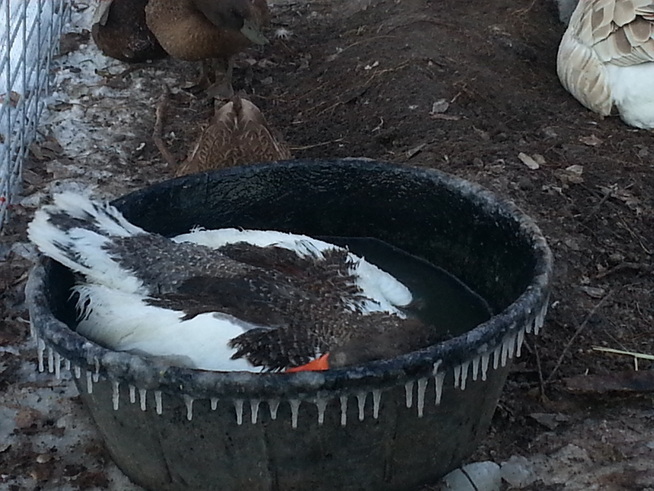
At the Fat Ewe Farm, the ducks and geese are housed together in a long hoop shelter, 16 by 8 by 6 feet high. It is covered with two tarps and the ground edge is shored with spoiled hay from the lambs next door, insulating the ground level area where the birds stay. In very cold weather, they tuck their legs up by their sides and rest their down covered bellies on the ground, nearly impervious to the cold. The females are better at tucking their heads under their wings than the males, but both will do it. Even when it is forty below, they want to get their whole bodies into the water for a bath. The droplets freeze on their feathers and they look like little ice men when they emerge. Then they spend the next hour preening, that is spreading the oil from their glands through their wet feathers. It is the preening that waterproofs them and weather proofs them and is very important in keeping them warm. If they do not have the opportunity to bathe, then they must at least have a bucket in which they can stick their heads or their eyes and nostrils can become pasty and dry. They will flick water on their bodies with their heads, similar to bathing, but not quite.
Aside from the water, they need to eat something. At this farm, they are fed whole oats, barley and wheat and dirt, plus oyster shells for calcium. The dirt is collected from the forest and is full of microbes and roots. They will spend hours rooting through it and gobble up whatever tasty morsels they find, along with the dirt. They do get minerals from the dirt. It is good to have the soil tested to see what they could ingest and what might be lacking. From time to time, they get lettuce and kitchen scraps and they do eat the meat that the dogs leave on their bones. People told me geese were strictly vegetarian, however; they are not. They will eat bugs, slugs, and worms, plus they do not mind nibbling at meat as well. Winter is hard for the waterfowl, because a good portion of their natural diet is grass, so I also feed them hay. They will eat the leaves and grass in the hay, especially any dried dandelions, which they seek out and gobble up rapidly. The roughage helps to keep their digestive tract healthy too, but they are getting roughage from the whole grains and the dirt/leaves/roots too.
I find the ducks very comical with their antics. They have become quite tame for the most part and do not move much when I walk amongst them. They also herd well and after one attempt to move them, they know where to go on their own. The geese have separate quarters, but they sleep with the ducks in the big house, along with two or three chickens and sometimes, if it is warmer, the guinea hens.Just a few duck or two geese could easily live in a dog house for the winter. Duck eggs are three times more nutritious than chicken eggs, but they do not generally lay in the winter in a normal situation. For that, they would need a heated coop and supplemental daylight. I believe in allowing their natural rhythms dictate their laying schedule because it gives their bodies a chance to rest and rejuvenate for spring. Ah, spring...just another six months away. Winter is a time of survival for the waterfowl, and for me.

 RSS Feed
RSS Feed